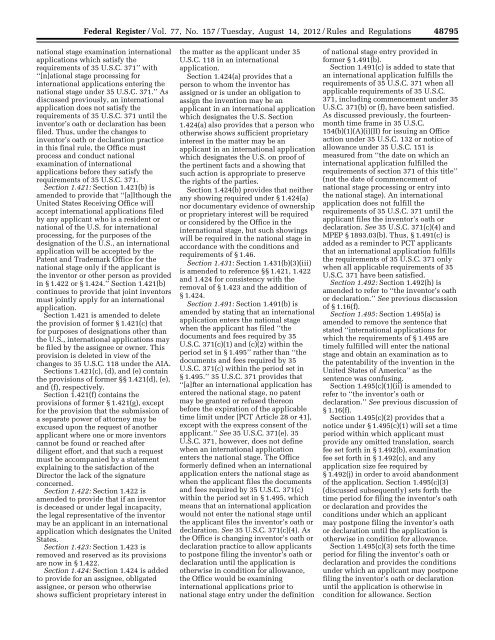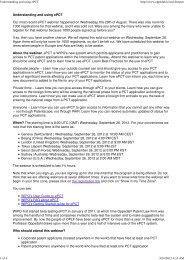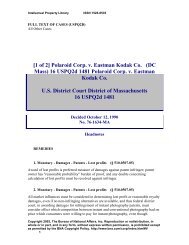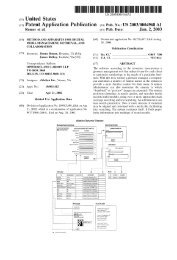sro<strong>be</strong>rts on DSK5SPTVN1PROD with RULES48794 Federal Register / Vol. 77, No. 157 / Tuesday, August 14, 2012 / Rules and Regulationsassignee of the entire interest if: (1) Theapplication does not seek to enlarge thescope of the claims of the originalpatent; or (2) the application for theoriginal patent was filed under § 1.46 bythe assignee of the entire interest. See 35U.S.C. 251(c).Section 1.175(d) provides that whereall errors previously identified in theinventor’s oath or declaration for areissue application pursuant to§ 1.175(a) are no longer <strong>be</strong>ing reliedupon as the basis for reissue, theapplicant must identify an error <strong>be</strong>ingrelied upon as the basis for reissue.Thus, a supplemental reissue oath ordeclaration is no longer required whereall errors previously identified in theinventor’s oath or declaration for areissue application pursuant to§ 1.175(a) are no longer <strong>be</strong>ing reliedupon as the basis for reissue. However,the applicant must still identify an error<strong>be</strong>ing relied upon as the basis for reissue(e.g., in the remarks of an amendment).A new reissue oath or declaration would<strong>be</strong> still required if the reissue oath ordeclaration pursuant to § 1.175(a) failsto identify any error or fails to identifyat least one error of the type that wouldsupport a reissue. See MPEP § 1402.Section 1.175 does not contain arequirement for supplemental reissueoaths or declarations in view of thechange to 35 U.S.C. 251 in section 20 ofthe AIA (i.e., removal of the ‘‘withoutany deceptive intention’’ provision insection 20 of the AIA).Section 1.175(e) provides that theinventor’s oath or declaration for areissue application required by§ 1.175(a) may <strong>be</strong> submitted under theprovisions of § 1.53(f), except that theprovisions of § 1.53(f)(3) do not apply toa reissue application. Thus, theinventor’s oath or declaration for areissue application must <strong>be</strong> present<strong>be</strong>fore a reissue application will <strong>be</strong>examined.Section 1.175(f) provides that therequirement for the inventor’s oath ordeclaration for a continuing reissueapplication that claims the <strong>be</strong>nefitunder 35 U.S.C. 120, 121, or 365(c) incompliance with § 1.78 of an earlierfiledreissue application may <strong>be</strong>satisfied by a copy of the inventor’s oathor declaration from the earlier-filedreissue application, provided that: (1)The inventor, or each individual who isa joint inventor of a claimed invention,in the reissue application executed aninventor’s oath or declaration for theearlier-filed reissue application, exceptas provided for in § 1.64; (2) thecontinuing reissue application does notseek to enlarge the scope of the claimsof the original patent; or (3) theapplication for the original patent wasfiled under § 1.46 by the assignee of theentire interest. Thus, the requirementfor the inventor’s oath or declaration fora continuing reissue application may <strong>be</strong>satisfied by a copy of the inventor’s oathor declaration from the earlier-filedreissue application except when all ofthe following conditions exist: (1) Theinventor’s oath or declaration for theearlier-filed reissue application wasexecuted by the patent owner and notby or with respect to the inventor, (2)the continuing reissue application seeksto enlarge the scope of the claims of theoriginal patent; and (3) the applicationfor the original patent was not filedunder § 1.46 by the assignee of theentire interest. Section 1.175(f) furtherprovides that if all errors identified inthe inventor’s oath or declaration fromthe earlier-filed reissue application areno longer <strong>be</strong>ing relied upon as the basisfor reissue, the applicant must identifyan error <strong>be</strong>ing relied upon as the basisfor reissue.Section 1.175(g) provides that an oathor declaration filed at any time pursuantto 35 U.S.C. 115(h)(1), will <strong>be</strong> placed inthe file record of the reissue application,but may not necessarily <strong>be</strong> reviewed bythe Office.Section 1.211: Section 1.211(c) isamended to no longer require ‘‘anexecuted oath or declaration’’ forpublication of the application. Section1.211(c) is also amended to state that theOffice may delay publishing anyapplication until it includes ‘‘theinventor’s oath or declaration orapplication data sheet containing theinformation specified in § 1.63(b)’’ andto no longer reference a petition under§ 1.47. These changes are due to thechange to §§ 1.53 and 1.495 to allowapplicants to postpone filing theinventor’s oath or declaration until theapplication is otherwise in condition forallowance.Section 1.215: Section 1.215(a) isamended to replace ‘‘executed oath ordeclaration’’ with ‘‘application datasheet and/or the inventor’s oath ordeclaration.’’ This change is due to thechange to §§ 1.53 and 1.495 to allowapplicants to postpone filing theinventor’s oath or declaration until theapplication is otherwise in condition forallowance.Section 1.215(b) is amended to statethat the patent application publicationwill include the name of the assignee,person to whom the inventor is underan obligation to assign the invention, orperson who otherwise shows sufficientproprietary interest in the matter if thatinformation is provided in theapplication data sheet in an applicationfiled under § 1.46.VerDate Mar2010 17:28 Aug 13, 2012 Jkt 226001 PO 00000 Frm 00020 Fmt 4701 Sfmt 4700 E:\FR\FM\14AUR6.SGM 14AUR6Section 1.215(c) is amended toreplace ‘‘oath or declaration’’ with‘‘application data sheet and/or theinventor’s oath or declaration.’’ Thischange is due to the change to §§ 1.53and 1.495 to allow applicants topostpone filing the inventor’s oath ordeclaration until the application isotherwise in condition for allowance.Section 1.321: Section 1.321(b) isamended to provide that a terminaldisclaimer must <strong>be</strong> signed by theapplicant or an attorney or agent ofrecord and state the present extent ofapplicant’s ownership interest in thepatent to <strong>be</strong> granted.Section 1.324: Section 1.324 isamended to no longer include a‘‘without deceptive intention’’requirement (as this requirement has<strong>be</strong>en eliminated from 35 U.S.C. 256 insection 20 of the AIA). Section 1.324(a)provides that whenever through error aperson is named in an issued patent asthe inventor, or an inventor is notnamed in an issued patent, the Director,pursuant to 35 U.S.C. 256, may, onapplication of all the parties andassignees, or on order of a court <strong>be</strong>forewhich such matter is called in question,issue a certificate naming only theactual inventor or inventors. See 35U.S.C. 256.Section 1.324(b) provides that anyrequest to correct inventorship of apatent pursuant to 1.324(a) must <strong>be</strong>accompanied by: (1) A statement fromeach person who is <strong>be</strong>ing added as aninventor and each person who iscurrently named as an inventor eitheragreeing to the change of inventorshipor stating that he or she has nodisagreement in regard to the requestedchange; (2) a statement from allassignees of the parties submitting astatement under 1.324(b)(1) agreeing tothe change of inventorship in the patent,which statement must comply with therequirements of § 3.73(c); and (3) the feeset forth in § 1.20(b).Section 1.324(c) provides a crossreference to § 1.48 for correction ofinventorship in an application.Section 1.324(d) provides that in aninterference under part 41, subpart D, ofthis title, a request for correction ofinventorship in a patent must <strong>be</strong> in theform of a motion under § 41.121(a)(2) ofthis title, and that in a contested caseunder part 42, subpart D, of this title, arequest for correction of inventorship ina patent must <strong>be</strong> in the form of a motionunder § 42.22 of this title. Section1.324(d) further provides that themotion under § 41.121(a)(2) or 42.22 ofthis title must comply with therequirements of § 1.324.Section 1.414: Section 1.414(c)(2) isamended to replace ‘‘[a]ccepting for
Federal Register / Vol. 77, No. 157 / Tuesday, August 14, 2012 / Rules and Regulations48795sro<strong>be</strong>rts on DSK5SPTVN1PROD with RULESnational stage examination internationalapplications which satisfy therequirements of 35 U.S.C. 371’’ with‘‘[n]ational stage processing forinternational applications entering thenational stage under 35 U.S.C. 371.’’ Asdiscussed previously, an internationalapplication does not satisfy therequirements of 35 U.S.C. 371 until theinventor’s oath or declaration has <strong>be</strong>enfiled. Thus, under the changes toinventor’s oath or declaration practicein this final rule, the Office mustprocess and conduct nationalexamination of internationalapplications <strong>be</strong>fore they satisfy therequirements of 35 U.S.C. 371.Section 1.421: Section 1.421(b) isamended to provide that ‘‘[a]lthough theUnited States Receiving Office willaccept international applications filedby any applicant who is a resident ornational of the U.S. for internationalprocessing, for the purposes of thedesignation of the U.S., an internationalapplication will <strong>be</strong> accepted by thePatent and Trademark Office for thenational stage only if the applicant isthe inventor or other person as providedin § 1.422 or § 1.424.’’ Section 1.421(b)continues to provide that joint inventorsmust jointly apply for an internationalapplication.Section 1.421 is amended to deletethe provision of former § 1.421(c) thatfor purposes of designations other thanthe U.S., international applications may<strong>be</strong> filed by the assignee or owner. Thisprovision is deleted in view of thechanges to 35 U.S.C. 118 under the AIA.Sections 1.421(c), (d), and (e) containthe provisions of former §§ 1.421(d), (e),and (f), respectively.Section 1.421(f) contains theprovisions of former § 1.421(g), exceptfor the provision that the submission ofa separate power of attorney may <strong>be</strong>excused upon the request of anotherapplicant where one or more inventorscannot <strong>be</strong> found or reached afterdiligent effort, and that such a requestmust <strong>be</strong> accompanied by a statementexplaining to the satisfaction of theDirector the lack of the signatureconcerned.Section 1.422: Section 1.422 isamended to provide that if an inventoris deceased or under legal incapacity,the legal representative of the inventormay <strong>be</strong> an applicant in an internationalapplication which designates the UnitedStates.Section 1.423: Section 1.423 isremoved and reserved as its provisionsare now in § 1.422.Section 1.424: Section 1.424 is addedto provide for an assignee, obligatedassignee, or person who otherwiseshows sufficient proprietary interest inthe matter as the applicant under 35U.S.C. 118 in an internationalapplication.Section 1.424(a) provides that aperson to whom the inventor hasassigned or is under an obligation toassign the invention may <strong>be</strong> anapplicant in an international applicationwhich designates the U.S. Section1.424(a) also provides that a person whootherwise shows sufficient proprietaryinterest in the matter may <strong>be</strong> anapplicant in an international applicationwhich designates the U.S. on proof ofthe pertinent facts and a showing thatsuch action is appropriate to preservethe rights of the parties.Section 1.424(b) provides that neitherany showing required under § 1.424(a)nor documentary evidence of ownershipor proprietary interest will <strong>be</strong> requiredor considered by the Office in theinternational stage, but such showingswill <strong>be</strong> required in the national stage inaccordance with the conditions andrequirements of § 1.46.Section 1.431: Section 1.431(b)(3)(iii)is amended to reference §§ 1.421, 1.422and 1.424 for consistency with theremoval of § 1.423 and the addition of§ 1.424.Section 1.491: Section 1.491(b) isamended by stating that an internationalapplication enters the national stagewhen the applicant has filed ‘‘thedocuments and fees required by 35U.S.C. 371(c)(1) and (c)(2) within theperiod set in § 1.495’’ rather than ‘‘thedocuments and fees required by 35U.S.C. 371(c) within the period set in§ 1.495.’’ 35 U.S.C. 371 provides that‘‘[a]fter an international application hasentered the national stage, no patentmay <strong>be</strong> granted or refused thereon<strong>be</strong>fore the expiration of the applicabletime limit under [PCT Article 28 or 41],except with the express consent of theapplicant.’’ See 35 U.S.C. 371(e). 35U.S.C. 371, however, does not definewhen an international applicationenters the national stage. The Officeformerly defined when an internationalapplication enters the national stage aswhen the applicant files the documentsand fees required by 35 U.S.C. 371(c)within the period set in § 1.495, whichmeans that an international applicationwould not enter the national stage untilthe applicant files the inventor’s oath ordeclaration. See 35 U.S.C. 371(c)(4). Asthe Office is changing inventor’s oath ordeclaration practice to allow applicantsto postpone filing the inventor’s oath ordeclaration until the application isotherwise in condition for allowance,the Office would <strong>be</strong> examininginternational applications prior tonational stage entry under the definitionVerDate Mar2010 17:28 Aug 13, 2012 Jkt 226001 PO 00000 Frm 00021 Fmt 4701 Sfmt 4700 E:\FR\FM\14AUR6.SGM 14AUR6of national stage entry provided informer § 1.491(b).Section 1.491(c) is added to state thatan international application fulfills therequirements of 35 U.S.C. 371 when allapplicable requirements of 35 U.S.C.371, including commencement under 35U.S.C. 371(b) or (f), have <strong>be</strong>en satisfied.As discussed previously, the fourteenmonthtime frame in 35 U.S.C.154(b)(1)(A)(i)(II) for issuing an Officeaction under 35 U.S.C. 132 or notice ofallowance under 35 U.S.C. 151 ismeasured from ‘‘the date on which aninternational application fulfilled therequirements of section 371 of this title’’(not the date of commencement ofnational stage processing or entry intothe national stage). An internationalapplication does not fulfill therequirements of 35 U.S.C. 371 until theapplicant files the inventor’s oath ordeclaration. See 35 U.S.C. 371(c)(4) andMPEP § 1893.03(b). Thus, § 1.491(c) isadded as a reminder to PCT applicantsthat an international application fulfillsthe requirements of 35 U.S.C. 371 onlywhen all applicable requirements of 35U.S.C. 371 have <strong>be</strong>en satisfied.Section 1.492: Section 1.492(h) isamended to refer to ‘‘the inventor’s oathor declaration.’’ See previous discussionof § 1.16(f).Section 1.495: Section 1.495(a) isamended to remove the sentence thatstated ‘‘international applications forwhich the requirements of § 1.495 aretimely fulfilled will enter the nationalstage and obtain an examination as tothe patentability of the invention in theUnited States of America’’ as thesentence was confusing.Section 1.495(c)(1)(ii) is amended torefer to ‘‘the inventor’s oath ordeclaration.’’ See previous discussion of§ 1.16(f).Section 1.495(c)(2) provides that anotice under § 1.495(c)(1) will set a timeperiod within which applicant mustprovide any omitted translation, searchfee set forth in § 1.492(b), examinationfee set forth in § 1.492(c), and anyapplication size fee required by§ 1.492(j) in order to avoid abandonmentof the application. Section 1.495(c)(3)(discussed subsequently) sets forth thetime period for filing the inventor’s oathor declaration and provides theconditions under which an applicantmay postpone filing the inventor’s oathor declaration until the application isotherwise in condition for allowance.Section 1.495(c)(3) sets forth the timeperiod for filing the inventor’s oath ordeclaration and provides the conditionsunder which an applicant may postponefiling the inventor’s oath or declarationuntil the application is otherwise incondition for allowance. Section
- Page 1:
UNIFORM CERTIFICATE OF ATTENDANCE F
- Page 4 and 5:
SPTO explains the America Invents A
- Page 6 and 7:
PTO/SB/01A (01-09)Approved for use
- Page 8 and 9:
PTO/SB/ (06-12)Approved for use thr
- Page 10 and 11:
PTO/ (06-12)Approved for use throug
- Page 12 and 13:
PTO/(06-1Approved for use through 0
- Page 14 and 15:
What will change about the oath ord
- Page 16 and 17:
Action item●●●If you have not
- Page 18 and 19:
But 37 CFR § 1.63 says:A person ma
- Page 20 and 21: ●●●Combined assignment anddec
- Page 22 and 23: ●●●●●●Consequences of i
- Page 24 and 25: How to file the ADSs●●If you pr
- Page 26 and 27: Supplemental ADSAny ADS filed after
- Page 28 and 29: Provisionals●●●Rules are a bi
- Page 30 and 31: Are all assignees applicants?●●
- Page 32 and 33: Substitute Statement●●●This f
- Page 34 and 35: ●●●Docket consequences of the
- Page 36 and 37: New Rule-46 practice67●●●Rule
- Page 38 and 39: Consequences of AIA for PCT filers
- Page 40 and 41: If you are entrusted the US nationa
- Page 42 and 43: ●●●Choosing between a “bypa
- Page 44 and 45: ●●●Getting your name and addr
- Page 46 and 47: Exercises relating to September 16,
- Page 48 and 49: Important AIA webinar September 6
- Page 50 and 51: Exercises relating to September 16,
- Page 52 and 53: 48776 Federal Register / Vol. 77, N
- Page 54 and 55: sroberts on DSK5SPTVN1PROD with RUL
- Page 56 and 57: sroberts on DSK5SPTVN1PROD with RUL
- Page 58 and 59: sroberts on DSK5SPTVN1PROD with RUL
- Page 60 and 61: sroberts on DSK5SPTVN1PROD with RUL
- Page 62 and 63: sroberts on DSK5SPTVN1PROD with RUL
- Page 64 and 65: sroberts on DSK5SPTVN1PROD with RUL
- Page 66 and 67: sroberts on DSK5SPTVN1PROD with RUL
- Page 68 and 69: sroberts on DSK5SPTVN1PROD with RUL
- Page 72 and 73: sroberts on DSK5SPTVN1PROD with RUL
- Page 74 and 75: 48798 Federal Register / Vol. 77, N
- Page 76 and 77: 48800 Federal Register / Vol. 77, N
- Page 78 and 79: 48802 Federal Register / Vol. 77, N
- Page 80 and 81: 48804 Federal Register / Vol. 77, N
- Page 82 and 83: 48806 Federal Register / Vol. 77, N
- Page 84 and 85: 48808 Federal Register / Vol. 77, N
- Page 86 and 87: 48810 Federal Register / Vol. 77, N
- Page 88 and 89: 48812 Federal Register / Vol. 77, N
- Page 90 and 91: 48814 Federal Register / Vol. 77, N
- Page 92 and 93: 48816 Federal Register / Vol. 77, N
- Page 94 and 95: sroberts on DSK5SPTVN1PROD with RUL
- Page 96 and 97: sroberts on DSK5SPTVN1PROD with RUL
- Page 98 and 99: 48822 Federal Register / Vol. 77, N
- Page 100 and 101: sroberts on DSK5SPTVN1PROD with RUL
- Page 102: 48826 Federal Register / Vol. 77, N





